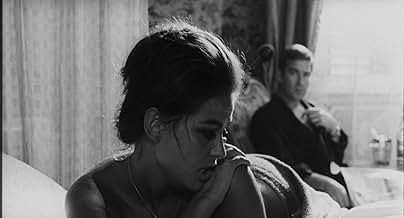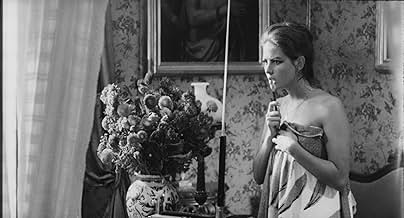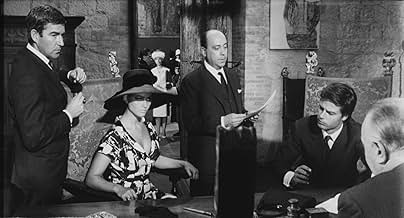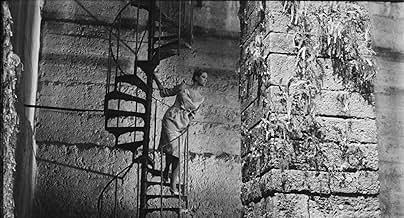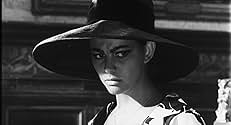Sandra torna nel suo villaggio d'infanzia per occuparsi degli affari di famiglia, ma i suoi ricordi e segreti d'infanzia tornano a perseguitarla.Sandra torna nel suo villaggio d'infanzia per occuparsi degli affari di famiglia, ma i suoi ricordi e segreti d'infanzia tornano a perseguitarla.Sandra torna nel suo villaggio d'infanzia per occuparsi degli affari di famiglia, ma i suoi ricordi e segreti d'infanzia tornano a perseguitarla.
- Regia
- Sceneggiatura
- Star
- Premi
- 3 vittorie e 2 candidature totali
- Party Guest
- (non citato nei titoli originali)
- Party Guest
- (non citato nei titoli originali)
Recensioni in evidenza
Here, Andrew (the outsider) is an interesting character. Innocently, (without receiving an oracle!), he analyzes 'the curse' of the dead father rationally, objectively and very ordinarily in vain and opens Pandora's box with his 'good' foolhardiness. Besides, he judges Gianni according to 'his' ethics as a total stranger and raises his fist against his brother-in-law. And still he is never involved in the mythology and should walk away forever. Is he an incarnation of our prosaic civilization of today? The establishment that he is an American (who has a camera!) could be an irony in Visconti's own way?
By the way, recently I watched Desperate Housewives, season 2, Episode 9, "That's Good, That's Bad", and suddenly I remembered the scene in which Gianni takes out the pills and threatens Sandra : George who took the pills menaces Bree ... (so I'm writing this comment now, but I know it's an exaggerated analogy, anyway....)
Jean Sorel is heavenly beautiful. The scene in the water tower takes my breath away. César Franck's music suits the aestheticism of the director, too.
If you are an amateur of Visconti's works, you might know this one doesn't end just as in the original script. Do you think Sandra flies across the ocean to join Andrew or she buries herself in her destined blood there eternally?
Including Mourning Becomes Electra, it could be interesting to refer to also : 1. Les Enfants terribles / Jean-Pierre Melville (1950) 2. Höhenfeuer /Fredi M. Murer (1985) 3. Jeux d'artifices / Virginie Thévenet (1987) 4. La Banyera / Jesús Garay (1989 / fantastic!)
Now, "Sandra Of A Thousand Delights" is still a point in Visconti's career where he's developing as a director. He's close but he's not quite there. Shot in black and white, and with an overly dark photography that emphasizes the desolate feel, even though this is a highly intense drama - perhaps too dramatic for it's own good, it doesn't have the necessary substance to back up the plot. In the end it's just a family drama and nothing more, even if it's a forceful one: Sandra reunites with her family on the eve of her father's memorial service but there's two dark secrets lurking in the shadows; her incestuous affair with her brother, and her adulterous mother's dereliction of her husband (Sandra's father) in a concentration camp.
Luchino Visconti's Sandra (1965), is a puzzling but splendorous visual treat that depicts incest, homo-eroticism, madness and collaboration with the Nazis. Its fairly slow pacing and reluctance to make obvious useful information will challenge those who spend hours a day gazing down at their QWERTY devices. However, "Sandra" is very rich and satisfying; it is flawlessly served up by the great Visconti. (I like it more than "The Leopard.")
A modernized retelling of the Greek myth Electra, an attractive, upper-class, socialite couple (Claudia Cardinale in the eponymous role, Michael Craig as her husband Andrew) return to the mansion of Sandra's youth (which she was forced to flee), to attend a small ceremony honoring her father, who was murdered by the Nazis at a concentration camp. When she is reunited with her unstable brother, Gianni (Jean Sorel), the physical connection between them is made very obvious. Their closer-than-normal relationship is never a secret to the audience, but revealing it is a big concern to Andrew and other observers, such as Sandra's barrister stepfather Gilardini (Renzo Ricci). The perpetually nervous Gilardini and Sandra's clinically insane mother (Marie Bell) may also have collaborated with the Nazis by betraying Sandra's father, creating an unusual conflict of pairs.
Shot in high-contrast Black and White, Visconti's skill at shooting his photogenic cast in tight quarters is evident. Because the English translation of the film is somewhat talky, it helps to develop the skill of quickly reading the subtitles in order to enjoy Visconti's work. It is amazing how precise and detailed the imagery is. The scenes between the anguished brother and steely sister are frequently filled with erotic tension. Visconti's trademark homo-eroticism is also present, but to a smaller degree.
One of the more interesting characters is Sandra's "first love" who is now a physician. He seems to personify not just a mixture of Sandra's husband and her brother, but also the Nazi collaborator Gilardini. At least, that's my interpretation of the final image.
Visconti's depiction of a decaying aristocratic family has great depth, and fans of the great director will not be disappointed with it.
The film is typical Visconti--a well-to-do upper class family returning to the childhood manor, picking up the memorable pieces of a rich and comfortable past before the World War II (literally in the film, the sale of valued paintings, property, and in this film, a garden that needs costly upkeep forcing the family now to gift it to the townsfolk as public property). Touches of Visconti's and Lampedusa's "The Leopard" made just before this film.
The original head of the family, Sandra's father was a Jew, and executed by the Nazis. He was exposed as a Jew by his wife, a famous pianist who fell in love with a lawyer. Sandra suspects the lawyer and her mother for her father's demise. Visconti never reveals why the Nazis spared the family members. Now Sandra's mother is demented and her father's statue in the garden is always covered in a white sheet giving the suggestion of a ghost. But the film is not about ghosts.
The film is more about Sandra (Cardinale) and her brother Gianni (Sorel) who reveal an past that might never have been consummated. Now that Sandra is married to Andrew (Craig), Gianni removes the wedding ring from Sandra's finger and wears it, Sandra's protests unheeded.
Visconti's script reveals that Sandra had a lover, Antonio (who still adores her, played by Ricci), but they could not marry because of the class divide and opposition from her mother to the relationship. Years later Antonio becomes a doctor who treats Sandra's demented mother.
While the film is not about ghosts, it is about a dark past, bitter memories, class and religious conflicts, that struggle to keep pace with the world outside the Italian town with a rich history. An electra complex emerges like a ghost--Visconti's images of Cardinale's body (especially her eyes that wonder who is outside her bedroom door) are absolutely top notch. There is no overt sex, no on screen and even the spoken words deny more than underscore it. you wonder about Sandra's mother if she is truly demented when she accuses her daughter Sandra of slithering in like a serpent.
Every bit of the film makes you wonder as you clutch at the straws the director throws as clues for the viewer to solve a big puzzle. The poem which provides the original Italian title of the film is one, There are more Solve them and you will love the film. Deserving of the Venice honor. Thank you, Cardinale and Sorel, for your unforgettable screen time in this film. A film that anticipates Visconti's "The Damned" and "Conversation Piece."
Lo sapevi?
- QuizOne of the first films in which Claudia Cardinale, who was born in Tunisia and whose first language was French, dubbed herself in Italian.
- Citazioni
Gianni Wald-Luzzati: Why can't you be honest for once? Did God tell you to become a nun? Did he tell you to get married and that would satisfy you? Did he tell you that nun's are sick with desire and frustration? That they're willing to mortify their flesh? Now, why must you torment yourself? Why should you fill so full of guilt? So wretched and alone?
- ConnessioniFeatured in Visconti (1967)
- Colonne sonorePrelude, chorale and fugue
Written by César Franck
I più visti
- How long is Sandra?Powered by Alexa
Dettagli
- Data di uscita
- Paesi di origine
- Sito ufficiale
- Lingue
- Celebre anche come
- Sandra
- Luoghi delle riprese
- Geneva, Canton de Genève, Svizzera(opening sequence: party at Sandra and Andrew's apartment)
- Aziende produttrici
- Vedi altri crediti dell’azienda su IMDbPro
Botteghino
- Lordo in tutto il mondo
- 927 USD
- Tempo di esecuzione
- 1h 45min(105 min)
- Colore
- Mix di suoni
- Proporzioni
- 1.66 : 1

